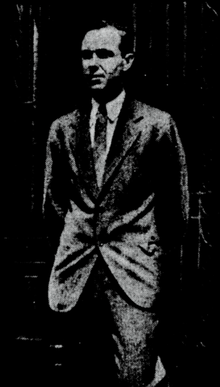Corliss Lamont
Corliss Lamont (March 28, 1902 – April 26, 1995) was an American socialist and humanist philosopher and advocate of various left-wing and civil liberties causes.
He wrote a book about the Soviet Union and praised what he saw there: "The people are better dressed, food is good and plentiful, everyone seems confident, happy and full of spirit".
[1] He became critical of the Soviets over time, but always thought their achievement in transforming a feudal society remarkable, even as he attacked its treatment of political dissent and lack of civil liberties.
Lamont later wrote that he "learned more about the American legal system in one day ... than in one year at Harvard Law School".
Under the influence of the Popular Front, Lamont and 150 other left-wing writers endorsed Josef Stalin's actions as necessary for "the preservation of progressive democracy".
Other founders included Professor Ralph Barton Perry of Harvard University and Edwin Seymour Smith.
Lamont remained sympathetic to the Soviet Union well after World War II and the establishment of satellite communist governments in Central and Eastern Europe.
He authored a pamphlet entitled The Myth of Soviet Aggression in which he wrote: The fact is, of course, that both the Truman and Eisenhower Administrations, in order to push their enormous armaments programs through Congress and to justify the continuation of the Cold War, have felt compelled to resort to the device of keeping the American people in a state of alarm over some alleged menace of Soviet or Communist origin.In 1944 Lamont wrote a preface to a book by Alter Brody that popularized the Soviet falsification of the Katyn massacre in the West.
[17] In 1951 and 1957, Lamont was denied a passport by the State Department, which considered his application incomplete because he refused to answer a question about membership in the Communist Party.
[19] He obtained his passport in June 1958 following a Supreme Court decision in another case, Kent v. Dulles, and left the U.S. for a world tour in March 1959.
[1] In the mid-1960s, Lamont became chairman of the National Emergency Civil Liberties Committee, a position he held until his death.
The foundation was formed "to promote enduring international peace, support for the United Nations, the conservation of our country's natural environment, and to safeguard and extend civil liberties as guaranteed under the Constitution and the Bill of Rights."
He funded the collection and preservation of manuscripts of American philosophers, particularly George Santayana, as well as Rockwell Kent and John Masefield.
[1] He became a substantial donor to both Harvard and Columbia, endowing the latter's "Corliss Lamont Professor of Civil Liberties.
Aside from books, over the course of more than a half-century, Corliss Lamont authored, co-authored, or edited approximately three dozen pamphlets on a variety of subjects.
Prominent among these was the Basic Pamphlets series, privately published by Dr. Lamont and sold directly by him through mail order via a local post office box in New York.
